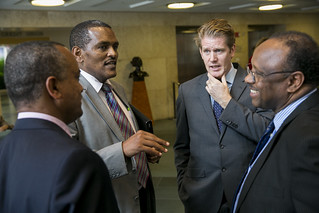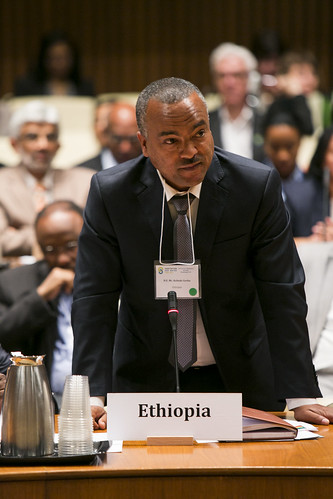By H.E. Ato Motuma Mekassa (Minister of Water, Irrigation and Electricity and Chair of the ONEWASH Steering Committee)

The World has endorsed the new Sustainable Development Goals (SDGs) in September 2015 which is the master world document till 2030. The SDGs are “pushing” us all as water and sanitation professionals to look beyond the “low hanging fruits” of the MDGs and start working for water supply, sanitation and hygiene provision in urban areas, remote rural settlements and in rapidly expanding small and medium size towns. The SDGs are also demanding us to think “universally” and to bring technological and social engineering solutions for everyone, everywhere…always.
So comes to the Sanitation and Water for All (SWA) High Level Ministerial Meeting in Addis Ababa in March 2016. My Government (the Government of Ethiopia) are hosting this event as it presents an opportunity for us as Ethiopians to show how we have tried to practice a universal access plan for all, everywhere…always. Our ONEWASH national programme was launched during the Millennium Development Goal era in 2013 and we set out to rapidly scale up WASH services to our population by aligning ourselves and our partners around a ONEWASH programme with ONE plan, ONE budget and ONE report. So far, progress has been good and Ethiopia was able to declare that it had reached the MDG Goal 7c target 10 for water supply last year in 2015. We as Ethiopians are proud to share this experience during the SWA meeting in March.
However, looking forward, the SWA platform also provides us an excellent opportunity to take the Ministerial participants to visit our beautiful country and to see some of our work in the field. One area we are working hard to address is water supply and sanitation services in emerging small and medium size towns. We call it URBAN WASH and it is very new for us. Until 2013, most of our people resided in rural areas. However now, our government is promoting a Growth and Transformation Plan-II (GTP)-II in which we are promoting small and medium towns as HUBS for industrial and manufacturing development….so naturally, more people (particularly our YOUTH) are migrating to our towns to work in enterprises. These all need water supply and sanitation that is appropriate and affordable. I therefore proud to say that we have partnered with the Government of Brazil and UNICEF to bring in new financial regulation and urban sanitation models to address this need.
I am personally looking forward to the SWA meeting in March and I hope to see you there.



